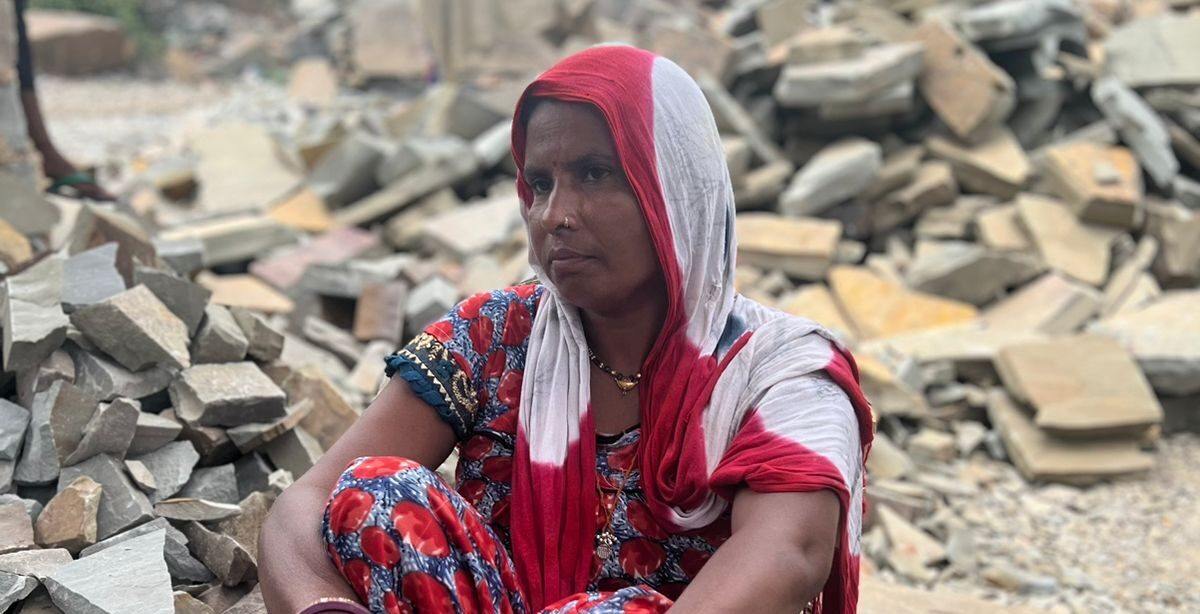Sunita, a casual worker with a vision for change
From a gender lens, the mining industry holds huge paradoxes between reality and what is acknowledged. Women as a workforce in the mining industry are mainly found outside formal employment, although they form a large segment of mineworkers. Protecting the rights of women workers throughout the entire mining industry supply chain is not adequately addressed through either the law or economic benefits.
Sunita (38), the mother of four children, has a story to share. The story of her as a family maker, casual worker, community leader, and entrepreneur who has a dream of developing a safe and convenient workplace for women engaged in cobblestone-making. Sunita is a resident of Patiyal village in the Budhpura region of Rajasthan’s Bundi district.
“My association with the Entrepreneurship Development Programme marked a turning point in my life – and that of others in my group. To begin with, in 2019 we formed a twelve-member Self Help Group (SHG). I was nominated to take on the role of chairperson. At first I was hesitant, and refused to accept the role due to fear and a lack of confidence in my abilities. Despite feeling like I couldn’t manage it, I was convinced to accept the position. The programme aimed to empower both men and women equally to work towards a poverty-free, sustainable, and bright future.
As the leader of the group, I went through a series of trainings. I learned about leadership, group management, hygiene and sanitation, entitlements, and business planning. Gradually I started to gain confidence in my role as leader of the group. As a leader, I motivate group members to develop a vision for their families to contribute to their savings regularly. We are now one of the best-performing self help groups in the area. By 2021 our savings had grown significantly, totalling over 1.25 lakh Rupees (€1,385). However, due to the long lockdown and resulting recession in the work, we had to distribute the savings among the members. We have started up the monthly savings again and every member contributes 500 Rupees every month. Our focus is shifting toward saving enough money to ensure better education for our children and take care of our health-related needs.
Like other members of my group, I have been engaged in cobblestone-making for about twelve years now. We used to worked in cobble yards and were paid a piece rate. Later, we started getting the raw materials at our homes. Our wages remained minuscule in both arrangements, and there was no consideration of health and safety. I had always wanted to start something on my own, so the EDP helped me to develop a vision for my own enterprise. Some four years back, I invested all my savings and set up a small workshop where I started producing a small number of cobblestones. I employed two women workers for this as well. We used to sell the finished material to suppliers through agents. This venture helped us to earn a little more money and freedom to work in a safe place and at our convenience.
My efforts came to a grinding halt in March 2020. The pandemic, and subsequent lockdown, meant severe restrictions on business. I was slowly burning through my savings and was unsure whether the work we had started would be able to continue. The work opportunities resumed when lockdown rules relaxed, but I didn’t have money to start again, and returning to casual labour was my only option. The Work: No Child’s Business programme came forward to help me. I was given financial support for working capital and to arrange a work shed. I started to work again and today we are five women working together. In this workplace we take care of all the basic needs (like safety, health) and payment.
My engagement in the mining sector as a casual worker and later as a home worker taught me several things. I used to work in small yards with many other women. These yards lack basic facilities such as drinking water, work sheds, and even toilets. On the other hand, I have family responsibilities as a wife, a mother, and a caregiver. These responsibilities and related societal expectations always present barriers. As women, we want a workplace that is safe and (also) takes our role in the family into account. My dream is to develop a safe and convenient workplace for women in my village … I’ve taken the first step in that direction and am committed to following the path! I thank WNCB for bringing about changes in our families and work, unlocking the tremendous potential hidden within us.”

